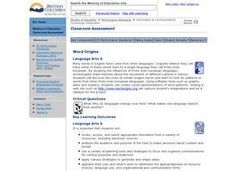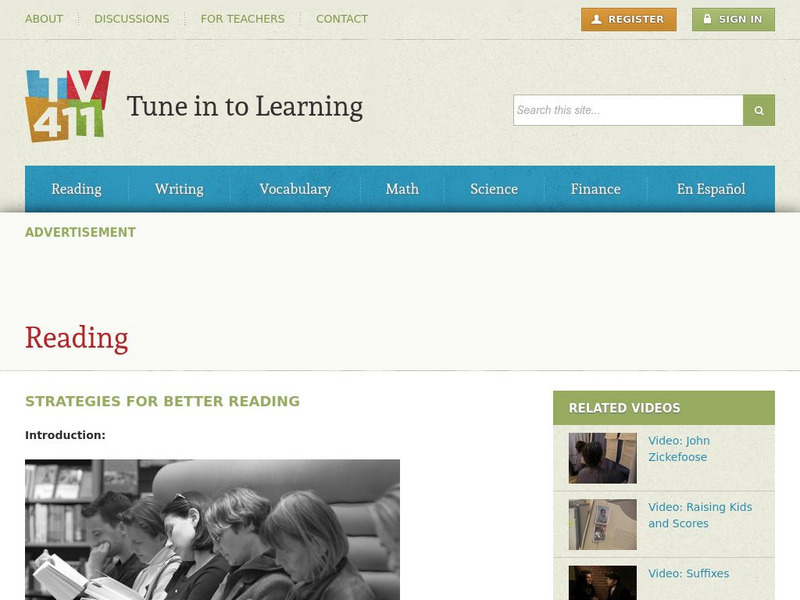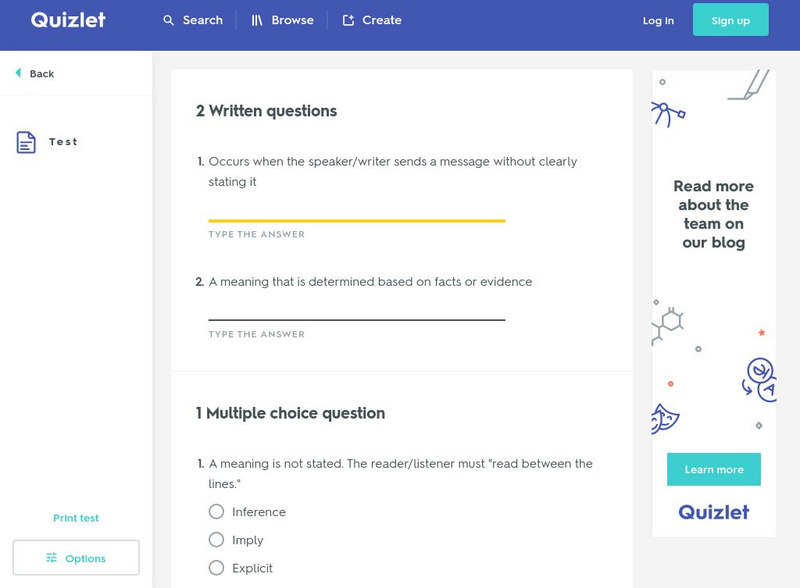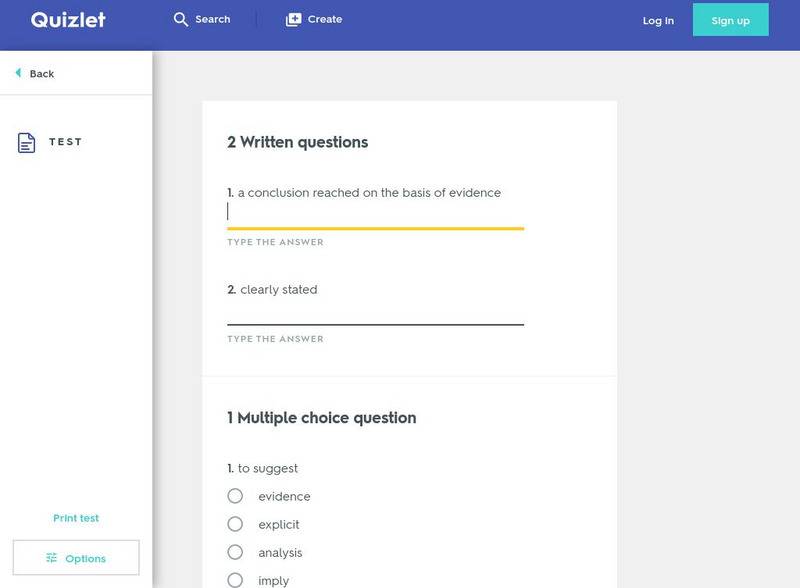Curated OER
Alliteration
Students write and illustrate a sentence which names a letter of the alphabet. The sentence should have subject, verb, describing words, and incorporate alliterative techniques.
Curated OER
Where Did My Lunch Come From? A U.S. Regional Tour
Middle schoolers explore the five regions of the United States. In this social studies instructional activity, students discuss the regions and the states located in that region. Middle schoolers discuss the types of food produced in...
Curated OER
Immigration/Migration
Sixth graders investigate the immigration into America by researching Ellis Island. In this United States History lesson, 6th graders research the Internet to view photographs and find information about the immigration to Ellis Island....
Curated OER
Black History Month
Students work in cooperative pairs to research information and give oral presentations about African American men and women who have made significant contributions to U.S. history.
Curated OER
A Comparison of Indentured Servants and Slaves
Sixth graders examine and compare the lives of slaves and indentured servants using primary sources and the historical fiction books, "Molly Bannaky and Barefoot." They analyze and compare advertisements for runaway slaves. Students...
Curated OER
Islamic Art
Middle schoolers examine the various forms of Islamic Art. Using the art, they identify the basic elements and research its history and style of calligraphy. They create a piece of art based on information they collected and...
Curated OER
As Seen on TV
Sixth graders research how minority groups are represented in media. In this media literacy lesson, 6th graders investigate two YouTube clips of Hugo Chavez and discuss different points of view.
Curated OER
The Underground Railroad and the I & M Canal in Illinois
Students, in groups, discuss the Underground Railroad, then fill out a worksheet.
Curated OER
Language Arts- Word Origins
Sixth graders locate, access, and select appropriate information from a variety of resources, including electronic sources. They analyze the audience and purpose of the task to make decisions about content and format.
Curated OER
Primary Sources
Young scholars write personal facts on a photograph of themselves to create a Primary Source. They then define Primary Source and list examples as a class of places where they could find primary sources. They also discuss the...
Curated OER
A Journey To Africa: Art And Artifacts
Students create a multimedia presentation based on a piece of African Art. They use the art piece to demonstrate the culture and ceremonies of the area in which it was produced. They research facts for a Power Point, write a poem...
E Reading Worksheets
E Reading Worksheets: Inferences Worksheets
In this learning module, students will learn more about making inferences. Worksheets are provided to reinforce the skill of making inferences. This module is designed to support Tier I, Tier II, and Tier III students.
Annenberg Foundation
Annenberg Learner: Journey North: Reading Strategies: Make Inferences and Draw Conclusions
Learn how to go beyond the literal meaning of a text by using a list of guiding questions to make inferences and draw conclusions.
Education Development Center
Tv411: Tune in for Reading: Reading: Strategies for Better Reading
Self-checking interactive tutorial puts reading comprehension skills to work by asking learners to make inferences, predict what happens next, and identify the main ideas in a series of short reading passages. Related materials include...
Tom Richey
Slide Share: Prediction and Inference: A Reading Strategy
This downloadable slideshow focuses on prediction and inference including the similarities and differences between them, when the reader does each, and questions to ask as you are reading.
Quizlet
Quizlet: Explicit, Implicit, Imply, Infer, Inferences Match
This interactive game of "Match" assesses students' knowledge of definitions associated with names of reading strategies. Students will match the correct reading strategy [explicit, implicit, imply, infer, inferences] to their...
Quizlet
Quizlet: Explicit, Implicit, Imply, Infer, Inferences Test
Reading strategy terms are included in this review exercise. An assessment is provided for the following words: explicit, implicit, imply, infer, and inferences. Five multiple choice questions are provided on this assessment.
E Reading Worksheets
E Reading Worksheets: Making Predictions Worksheets and Lessons
In this learning module, students will learn more about making predictions in reading. Worksheets and a leson are provided to support Tier I, Tier II, and Tier III students.
Quizlet
Quizlet: 8th Grade Evidence/inference Test
Reading strategy terms are included on this vocabulary test. This test assesses the following words: analysis, evidence, explicit, imply, and inferences. Five multiple choice questions are provided on this assessment.
Quizlet
Quizlet: Explicit, Implicit, Imply, Infer, Inferences Flashcards
Reading strategy terms are included in this review exercise. Interactive vocabulary flashcards are provided for the following words: explicit, implicit, imply, infer, and inferences.
PBS
Pbs Learning Media: Walmart Middle School Litercy Initiative
Interactive, student-paced lessons on such literacy skills as categorizing, comparing and contrasting, summarizing, evaluating, determining cause and effect, using text features, connecting, inferring, sequencing, understanding problems...
TES Global
Blendspace: Making Inferences, Context Clues, &The Outsiders Vocabulary
A six-part learning module with links to videos to use while reading S. E. Hinton's The Outsiders.
Quizlet
Quizlet: Stated Main Idea, Inferred, Implied, Main Idea Match
Nonfiction reading terms are included in this review "Match" game. Questions are provided for the following words: stated main idea, inferred, implied, and main idea. Images of each of these nonfiction reading terms are also included.
University of Illinois
University of Illinois Extension: Character Education "Old Wisdom"
Excellent resource for empowering learners to become better learners. This lesson includes motivating students to read, encouraging learners to use inferential and critical thinking skills, and promoting an understanding and appreciation...























